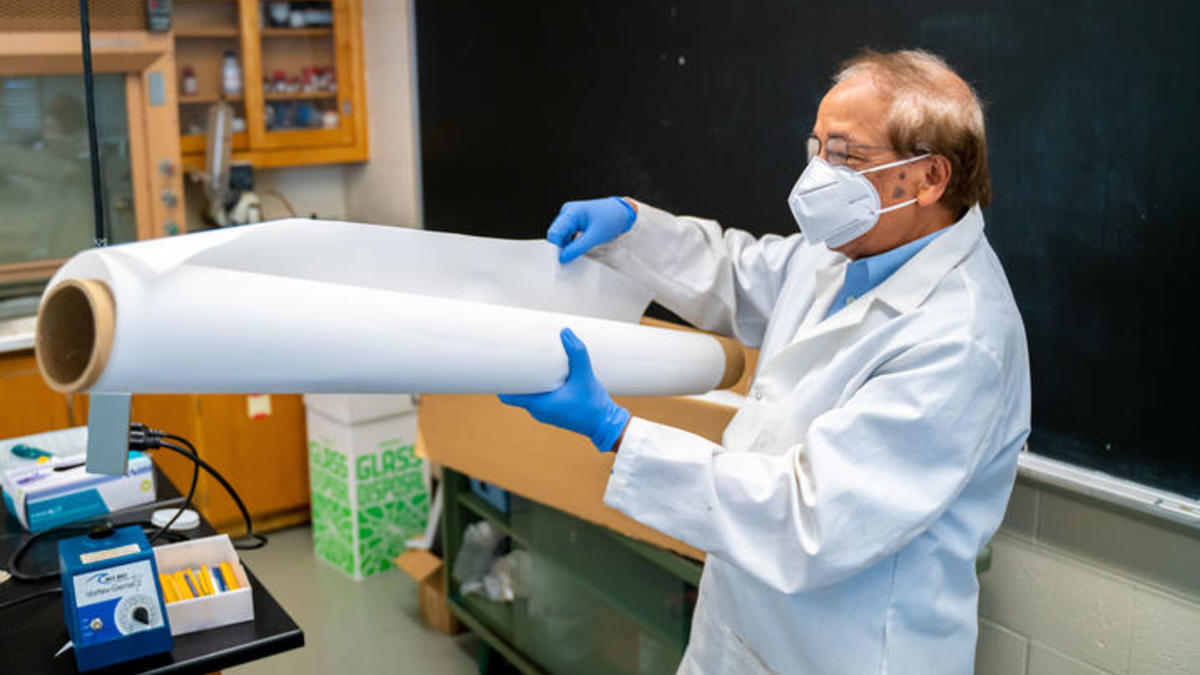By Elizabeth Chapin
At the beginning of the COVID-19 pandemic in 2020, Bhattacharyya, known to friends and colleagues as “DB,” along with collaborators across disciplines at UK, received a grant from the National Science Foundation (NSF) to create the material. Their work was published in the Nature journal Communications Materials on May 24.
SARS-CoV-2 is covered in spike proteins, which allow the virus to enter host cells once in the body. The team developed a membrane that includes proteolytic enzymes that attach to the protein spikes and deactivates them.
“This new material can filter out the virus like the N95 mask does, but also includes antiviral enzymes that completely deactivate it. This innovation is another layer of protection against SARS-CoV-2 that can help prevent the virus from spreading,” said DB, the director of UK’s Center of Membrane Sciences. “It’s promising to the development new products that can protect against SARS-CoV-2 and a number of other human pathogenic viruses.”
DB’s team included J. Todd Hastings, Ph.D., Thomas Dziubla, Ph.D., and Kevin Baldridge, Ph.D. from the College of Engineering; Yinan Wei, Ph.D., a former professor in the College of Arts and Sciences’ Department of Chemistry; and Lou Hersh, Ph.D., in the College of Medicine’s Department of Molecular and Cellular Biochemistry. College of Engineering doctoral student Rollie Mills (NSF Graduate Fellow and first author of the article), and undergraduate students Ronald Vogler, Matthew Bernard and Jacob Concolino contributed extensively to the project.
The team developed the membrane, which was fabricated through an existing collaboration with a large-scale membrane manufacturer. It was then tested using SARS-CoV-2 spike proteins that were immobilized on synthetic particles. Not only could the material filter out coronavirus-sized aerosols, but it was also able to destroy the spike proteins within 30 seconds of contact.
The study reports that the membrane provided a protection factor above the Occupational Safety and Health Administration’s standard for N95 masks, meaning that it could filter at least 95% of airborne particles.
“These membranes have been proven to be a promising system of advancement toward the new generation of respiratory face masks and enclosed-environment filters that can significantly reduce coronavirus transmission by virus protein deactivation and enhanced aerosol particle capture,” the study reports.
The new membrane builds upon the center’s National Institute of Environmental Health Sciences (NIEHS) and NSF-funded activities, which have developed various functionalized membranes for environmental remediation. In contrast to passive membranes, functionalized membranes provide additional benefits by interacting with undesired particles like viruses through selective binding or deactivation.
Research reported in this publication was supported by the National Institute of Environmental Health Sciences of the National Institutes of Health under Award Number P42ES007380. The content is solely the responsibility of the authors and does not necessarily represent the official views of the National Institutes of Health.
Research reported in this publication was supported by the National Science Foundation under Award Number 2030217. The opinions, findings, and conclusions or recommendations expressed are those of the author(s) and do not necessarily reflect the views of the National Science Foundation.
The University of Kentucky is increasingly the first choice for students, faculty and staff to pursue their passions and their professional goals. In the last two years, Forbes has named UK among the best employers for diversity, and INSIGHT into Diversity recognized us as a Diversity Champion four years running. UK is ranked among the top 30 campuses in the nation for LGBTQ* inclusion and safety. UK has been judged a “Great College to Work for" three years in a row, and UK is among only 22 universities in the country on Forbes' list of "America's Best Employers." We are ranked among the top 10 percent of public institutions for research expenditures — a tangible symbol of our breadth and depth as a university focused on discovery that changes lives and communities. And our patients know and appreciate the fact that UK HealthCare has been named the state’s top hospital for five straight years. Accolades and honors are great. But they are more important for what they represent: the idea that creating a community of belonging and commitment to excellence is how we honor our mission to be not simply the University of Kentucky, but the University for Kentucky.
